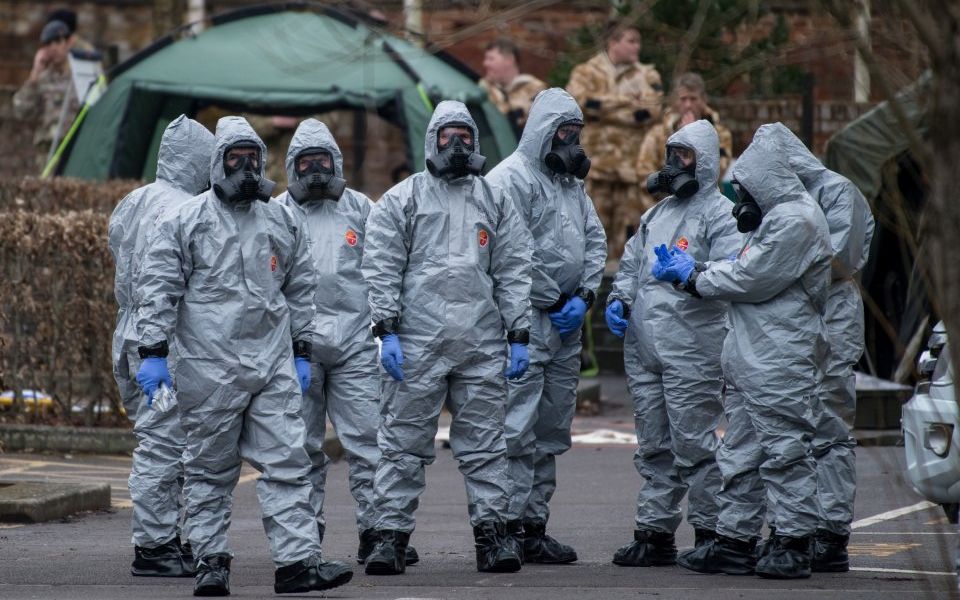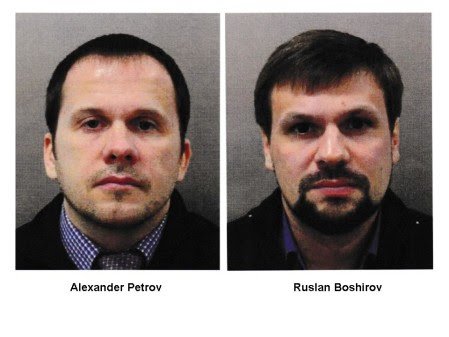Russian Skripal suspects charged and named as Alexander Petrov and Ruslan Boshirov

British authorities have named two suspects they believe are behind the Novichok attack on Sergei and Yulia Skripal in Salisbury earlier this year as Russian nationals Alexander Petrov and Ruslan Boshirov.
The two men have been charged in absentia with offences including conspiracy to murder over the Salisbury nerve agent attack, Scotland Yard and the Crown Prosecution Service has announced. However they are not expected to be extradited, because Russian law forbids it.
Police say Petrov and Boshirov – thought to be aliases – arrived in Heathrow on 2 March from Moscow, travelling into central London before going to Salisbury, where it is thought they sprayed Novichok on Sergei Skripal's front door handle.
The men are thought to have used a fake Nina Ricci perfume bottle to carry out the attack, which was then later picked up by Charlie Rowley and Dawn Sturgess, who fell ill in June.
Sturgess died as a result of the exposure.

Neil Basu, national lead for Counter Terrorism Policing, said: "Today marks the most significant moment so far in what has been one of the most complex and intensive investigations we have undertaken in Counter Terrorism policing; the charging of two suspects – both Russian nationals – in relation to the attack on Sergei and Yulia Skripal. I would like to thank the Crown Prosecution Service for their independent assessment of the evidence in this case.
"This has been a highly complex investigation for UK policing, which would have been impossible without the great staff and abilities of the UK intelligence community and the support of the government.
"My thoughts remain with Dawn Sturgess’s family as they come to terms with their loss, the other victims who fell seriously ill after being exposed to a Novichok nerve agent and the people of Salisbury who have shown tremendous resilience throughout."
He praised the teams involved in "meticulously" tracing evidence over the last six months, adding: "Let me be clear, we have no doubt these two incidents are connected and now form one investigation.
"Today’s announcement by the CPS marks the most significant development in this investigation. We now have sufficient evidence to bring charges in relation to the attack on Sergei and Yulia Skripal in Salisbury and domestic and European arrest warrants have been issued for the two suspects. We are also seeking to circulate Interpol Red Notices."
Sturgess, a mother of three, and Rowley were not deliberately targeted, he confirmed, but "became victims as a result of the recklessness in which such a toxic nerve agent was disposed of".
The charges include conspiracy to murder Sergei Skripal; the attempted murder of Sergei Skripal, Yulia Skripal and Nick Bailey; the use and possession of novichok contrary to the Chemical Weapons Act; and causing grievous bodily harm with intent to Yulia Skripal and police officer Nick Bailey.
Prime Minister Theresa May is expected to give an update to the House of Commons this afternoon, following PMQs. Key stakeholders around the world have already been briefed on the details.
The Skripals were found unconscious on a bench in Salisbury back in March, and analysis carried out at Porton Down identified the cause as nerve agent Novichok.
Theresa May blamed the Kremlin for the attack on the former spy and his daughter, expelling undeclared Russian agents from the UK and prompting a wave of similar moves from allies across the world.
Yesterday the Organisation for the Prohibition of Chemical Weapons (OPCW) backed the government in assessing that the chemical agent responsible for the death of Dawn Sturgess in Amesbury on 8 July was Novichok, the same kind used in the attempted assassinations of Sergei and Yulia Skripal earlier this year.
Foreign secretary Jeremy Hunt said: "The recklessness of the Russian state in bringing a nerve agent in to the UK, and total disregard for the safety of the public, is appalling and irresponsible. Our thoughts are with the family of Dawn Sturgess, and with Charlie Rowley.
“This is another reminder of the importance of the international community standing together to uphold the global ban on all use of chemical weapons, and ensure that the rules based international order is respected so we can all keep our citizens safe.”
More to follow…